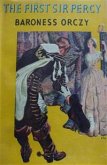Arsène Lupin, Gentleman Burglar is the first collection of stories by Maurice Leblanc recounting the adventures of Arsène Lupin, containing the first eight stories depicting the character, each was first published in the French magazine Je sais tout following the first on 15 July 1905. The seventh features fictional English detective Sherlock Holmes.The collection contains the following stories:"The Arrest of Arsène Lupin""Arsène Lupin in Prison""The Escape of Arsène Lupin""The Queen's Necklace""Sherlock Holmes Arrives Too Late""The Black Pearl""Seven of Hearts"









